
The Department of Electronics & Communication Engineering was established in the year 2001 with an intake of 60. Subsequently, the current intake has increased to 120. The department has well-equipped laboratories with Dedicated, Committed and Experienced faculty members.
Department of ECE also offers two PG Courses M.Tech in VLSI System Design and M.Tech in Embedded Systems.
Since from the inception, the department has been imparting quality education to the students and department has established itself as a well-organized, self-reliant for producing the most energetic, enthusiastic and professionally competent Electronic Engineers with good placements and higher studies record. The department and Institute has added number of collaborations and MOUs with reputed academic institutions and industries.
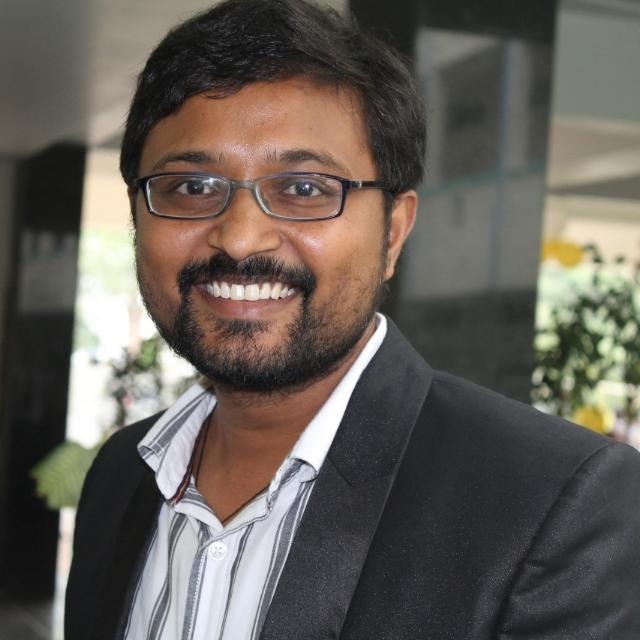
Dr.Md.Javeed
Head of the Department-ECE
HOD’s message
With rapidly growing technology and the continuous need for innovation the department has always produced eminent professionals, our college takes pride in announcing that it offers project-based education system in the 4 years Engineering degree. This facility is one of a kind that helps students become industry ready.
Our institute offers a 4-year Bachelor’s Degree, 2-year Master’s Degree and a 3-years long diploma in Electronics & Communication Engineering (ECE).
C.V. : Dr.Md.Javeed
VISION OF THE DEPARTMENT
To become reputed center for Electronics & Communication Engineering education and inventions for the benefit of the society in India.
MISSION OF THE DEPARTMENT
- Train the Stakeholders to gain knowledge in Electronics & Communication Engineering.
- Promote and involve in Social, Professional & Leadership activities.
- Provide state of the Art facilities to promote logical and innovative thinking.
- Collaborate to meet the challenges and betterment of the mankind.
PROGRAM EDUCATIONAL OBJECTIVES (PEOs)
PEO 1: Pursue successful career in industry, research by applying contemporary Science, Engineering and Technical Skill with professional ethical values.
PEO 2: Apply the Technical Skills, Analyze the Requirements, Prepare Technical Specific designs and provide novel Engineering Solutions with Ethics.
PEO 3: Work in Multidisciplinary teams with effective Interpersonal skills to develop Sustainable Solutions for Industry and Society.
PEO 4: Adopt the Recent Emerging Technologies and become a lifelong learner to analyze and produce efficient product designs.
PROGRAM OUTCOMES (POs)
PO 1: Engineering knowledge: Apply the knowledge of mathematics, science, engineering fundamentals, and an engineeringspecialization to the solution of complex engineering problems.
PO 2: Problem analysis: Identify, formulate, research literature, and analyze complex engineering problems reaching substantiated conclusions using first principles of mathematics, natural sciences, and engineering sciences.
PO 3: Design/development of solutions: Design solutions for complex engineering problems and design system components or processes that meet the specified needs with appropriate consideration for the public health and safety, and the cultural,societal, and environmental considerations.
PO 4: Conduct investigations of complex problems: Use research-based knowledge and research methods including design of experiments, analysis and interpretation of data, and synthesis of the information to provide valid conclusions.
PO 5: Modern tool usage: Create, select, and apply appropriate techniques, resources, and modern engineering and IT tools including prediction and modeling to complex engineering activities with an understanding of the limitations.
PO 6: The engineer and society: Apply reasoning informed by the contextual knowledge to assess societal, health, safety, legal and cultural issues and the consequent responsibilities relevant to the professional engineering practice.
PO 7: Environment and sustainability: Understand the impact of the professional engineering solutions in societal and environmental contexts, and demonstrate the knowledge of, and need for sustainable development.
PO 8: Ethics: Apply ethical principles and commit to professional ethics and responsibilities and norms of the engineering practice.
PO 9: Individual and team work: Function effectively as an individual, and as a member or leader in diverse teams, and in multidisciplinary settings.
PO 10: Communication: Communicate effectively on complex engineering activities with the engineering community and with society at large, such as, being able to comprehend and write effective reports and design documentation, make effective presentations, and give and receive clear instructions.
PO 11: Project management and finance: Demonstrate knowledge and understanding of the engineering and management principles and apply these to one‟s own work, as a member and leader in a team, to manage projects and in multidisciplinary environments.
PO 12: Life-long learning: Recognize the need for, and have the preparation and ability to engage in independent and life-long learning in the broadest context of technological change.
PROGRAM SPECIFIC OUTCOMES (PSOs)
PSO 1: Apply concept of Electronics and Communication, Signal Processing, VLSI, Embedded System in the design and implementation of complex electronics systems.
PSO 2: An ability to solve complex problems using latest hardware and software tools along with analytical skills to arrive cost effective and appropriate solutions.
PSO 3: Develop application with the demonstration the social awareness and environmental wisdom along with ethical responsibility to develop real world application using optimal resources.
List of laboratories in Electronics and Communication Engineering
| No. |
Name of the Lab |
Year/Sem |
Room No. |
| 1 |
Electronic Devices and Circuits |
II & I |
336 |
| 2 |
Basic Simulation |
II & I |
208 |
| 3 |
Digital System Design |
II & I |
220 |
| 4 |
Electronic Circuit Analysis |
II & II |
336 |
| 5 |
Analog and Digital Communications |
II & II |
217 |
| 6 |
IC Applications |
II & II |
220 |
| 7 |
Microcontroller and Microprocessor |
III & I |
204 |
| 8 |
Digital Signal Processing |
III & II |
208 |
| 9 |
E-CAD |
III & II |
404 |
| 10 |
Microwave and Optical Communications |
IV & II |
218 |
| 11 |
Analog and Digital Electronics |
II & II |
217 |
| 12 |
Analog Electronics |
II & I |
216 |
| 13 |
Digital Electronics |
II & II |
216 |
| 14 |
Signals and Systems |
III & II |
208 |


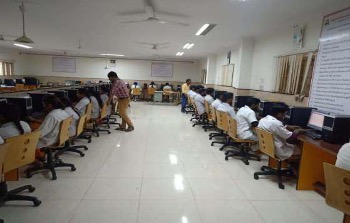
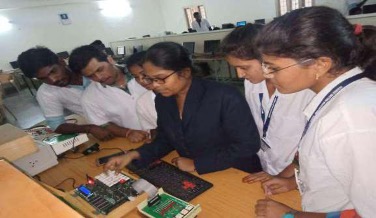
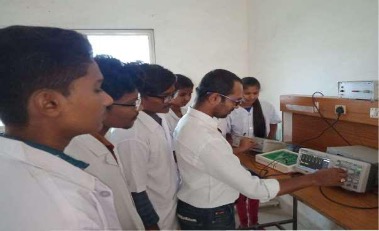
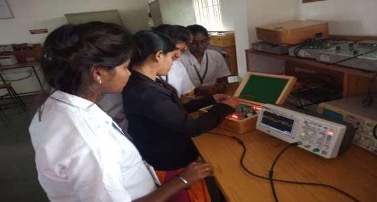
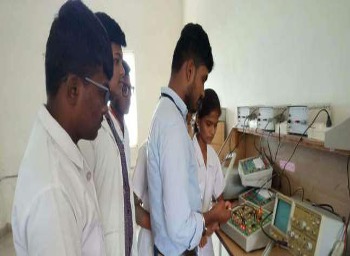
The objective of the department library is to provide knowledge resources to the Faculty members and students of the Electronics and Communication Engineering. At present we have Good number of books, which cover all the major areas of electronics and communication engineering. Students as well as faculty of the Electronics and Communication Engineering can borrow books from the library. Each year new books are added to the present collection.
Different resources available in the department library are,
- Text books, Reference Books.
- Sample copies of Minor and Major Project reports.
- Lab manuals.
- Previous years Question papers.
Faculty members in order to provide quality content to the students prepare the course and materials properly. Such arranged materials are compiled in the form of course file. Contents of sample course file:
Sample course file
Institution has a structured mechanism to receive feedback from all the stakeholders to understand the adequacy of the curriculum. The opinion of the stakeholders is communicated to the University authorities for necessary improvements. Some of the important steps followed for identifying curriculum gaps and content delivery:
Curriculum Gaps Identification
Our institution believes in strong mentoring and a well-organized mentoring system is followed with an average of 10-12 students for each faculty, who takes care of students growth through curricular, co-curricular and extra-curricular activities.
These Mentors will interact with the students and their parents as well to address their academic and personal needs for their career and all-round development of the student.
Mentors having diverse backgrounds i.e., inter-disciplinary are also invited from other institutes for sharing information related to idea creation, innovation and entrepreneurship.
Identifying the advanced learners and slow learners is an important part in teaching the students. They are identified based on their performance in the class tests/assessments and internal exams. After that, necessary steps are taken for each of the category students. Details are as follows:
Advanced and Slow Learners
Class timetable and detailed list of faculty members for 2nd yr, 3rd yr & 4th yr subjects can be seen through:
Class timetables
Glance - Few Eminent persons with rich experience in industry and research oriented have visited the Electronics and Communication Engineering recently,
1) Dr.Sajid Basith - HR at Nuclear Fuel Complex, Hyderabad, Telangana.
2) Dr. G.Prasad - Scientist G, National Remote Sensing Centre, Hyderabad, Telangana.
3) Mr.Veera Reddy - Director, Cyber Aegis, Hyderabad, Telangana.











